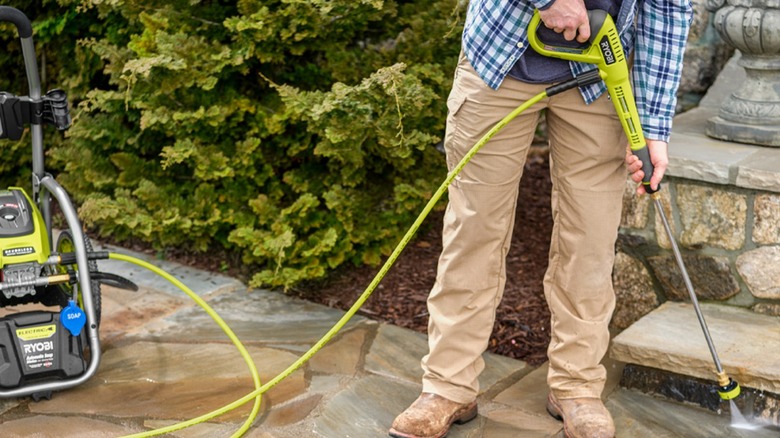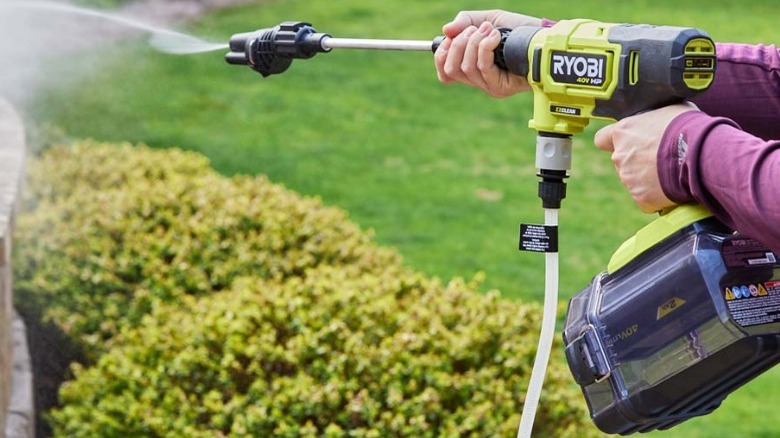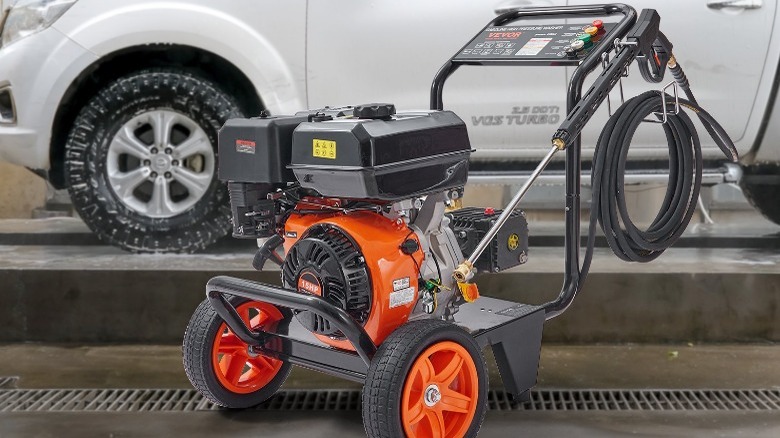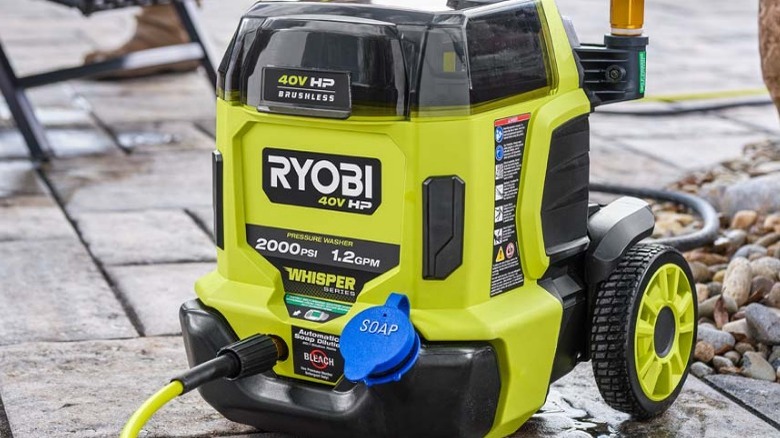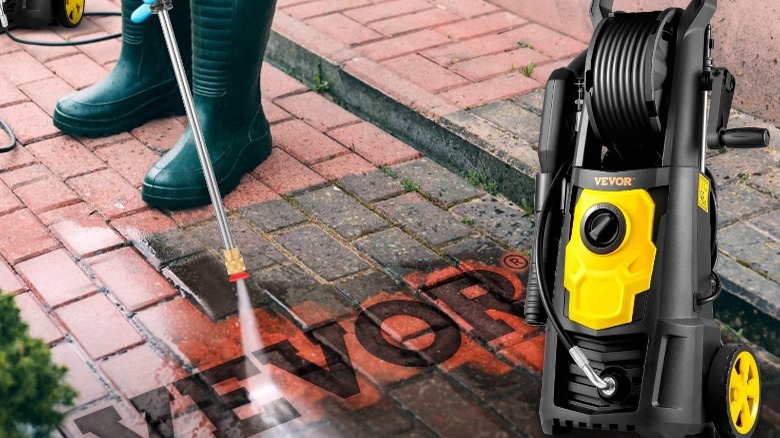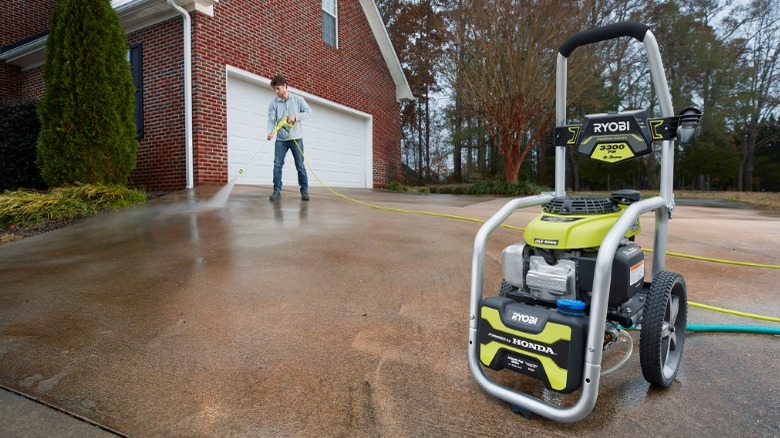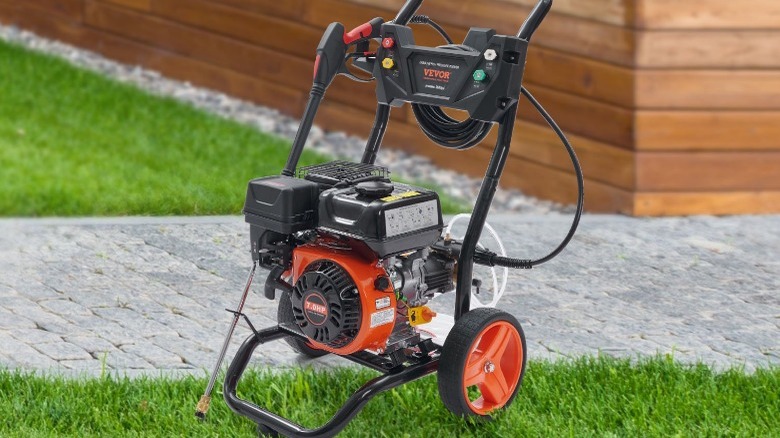Vevor Vs. Ryobi Pressure Washers: How Do They Differ & Which Is Better?
We may receive a commission on purchases made from links.
A quality pressure washer is one of those things that you might not think you need until you have one, and you wonder how you ever managed to live without it. There are several ways to use a pressure washer around the house, whether you're cleaning out your grill, washing your deck, stripping varnish, or blasting the moss off your walkways. Some are electric or battery powered, while others are gas-powered. Some have large tanks, while others connect directly to the hose. Power also varies, as some are strong enough to rip paint off the side of a house, while others are perfect for washing your car with. But to choose the right one for your needs, you'll first want to know about the range of models on offer from some of the industry's leading brands.
Vevor and Ryobi are both prominent budget-friendly pressure washer manufacturers. Vevor products can be found in stores all over the country including major retailers like Lowes, Home Depot, and Walmart as well as online marketplaces such as eBay and Amazon. Ryobi, on the other hand, is Home Depot's primary store brand when it comes to power tools and its tools can only be found on Home Depot and occasionally on Amazon. Both companies make a wide assortment of different pressure washers across a spectrum of price points and power levels. But those who are considering purchasing a pressure washer from one of them will probably want to know how these companies' lineups differ, and which of them makes the better products.
Ryobi has a larger product range
One of the first things that you'll want to take a look at when comparing brands is the range of products that each of them has to offer. A wider variety of options means that consumers can expect a greater selection of power levels, features, and price points.
Vevor currently has 13 different models listed on its company website. This is an impressive assortment, boasting models across a variety of different build styles and power levels. It has three portable pressure washers, seven electric washers, and three gas ones. There is some overlap in power outputs, but the catalog covers a moderately wide range in both price and build quality.
Ryobi has considerably more options, however. The company currently has 19 different models listed: four portable units, three battery-powered tank units, eight electric washers, and four gas-powered models. These offer a range of different features and come in several different form factors. It's worth noting, though, that even though there are more Ryobi models to choose from, the range in power levels is actually narrower.
Vevor has the most power
Power output on a pressure washer is measured by two different metrics: PSI and GPM. PSI, or pounds per square inch, measures the amount of pressure that the water is under when exiting the nozzle of the pressure washer. GPM, or gallons per minute, measures the volume of water that is expelled over time. Both of these numbers play a role in how effective a pressure washer is at removing material. Brands usually categorize washers by PSI, but many experts argue that GPM is actually the more important metric when it comes to measuring a power washer's cleaning ability.
The three portable Vevor washers are all on the weaker side of the spectrum. They put out 290-652 PSI and 1.0-1.1 GPM. These are good for washing cars, bicycles, walls, and windows since they're unlikely to damage the paint or glass, but they're less suited to cleaning stone, wood, or other, more porous materials that might require a bit more power. The electric units range from 2,000-2,300 PSI and 1.65-1.9 GPM, making them a solid middle-grade option. Then there are the gas units that range from 3,400-4,400 PSI and 2.6-4.0 GPM. These are about as powerful as anything you might need outside of the professional market.
Now let's look at what Ryobi has in stock. The handheld models are 320-600 PSI and 0.2-0.7 GPM, the battery and electric models are 1,200-3,000 and 1.0-1.2 GPM, and the gas models are 3,000-3,300 PSI and 2.3-2.5 GPM. So while Ryobi dominates the electric middle ground, its washers are considerably weaker when it comes to handheld and gas models.
Ryobi has more battery powered options
Another thing you might want to consider is the power source. Each of them has their strengths and weaknesses. Cordless units are portable, but tend to be low in power and have a time limit before they run out of juice. Electric washers tend to be somewhere in the 2,000 PSI range and are tethered to power outlets. Then there are the gas powered options, which are powerful and also cordless, but are loud and require a bit more maintenance. We've already gone over the pressure output options for each of these models, but it's worth taking a closer look at the battery powered options, since the batteries themselves are an important component in their operation.
All of the handheld units from both brands are battery powered. The three Vevor models all include 20V 4.0Ah Vevor brand batteries. These are about the size you would typically expect to use with most smaller hand tools, like a drill. The Ryobi 320 PSI and 600 PSI models have the option to come with similar 18V 4.0Ah batteries, and so you could probably expect similar longevity and overall performance. The other two models use 40V One+ batteries, which are not included with the purchase of the tools. These are considerably more powerful, but are also more expensive.
The three battery-powered tank units that Ryobi sells, such as the Ryobi Brushless Whisper Series 1500 PSI, are also powered by the 40V batteries. This makes sense, since the 18V line likely wouldn't be powerful enough to operate a tool this size.
Vevor is cheaper
Now let's talk price. Both Vevor and Ryobi are considered budget friendly brands, but it's worth taking a look at a few of the more comparably spec models to see if either of them offers a bit more bang for your buck.
Starting with the portable sprayers, the two most similar options are the Vevor Cordless 652 and the Ryobi 18V HP EX Clean. Both models come with 4.0Ah batteries and chargers, and both have similar power outputs. The Vevor has a slightly higher max PSI, but it's much cheaper, going for just $78.99 while the Ryobi model is $149.00 on Amazon.
Then there are the electric units. Both offer a standard 2,000 API model, but we see a similar story here. Once again, the Vevor is cheaper at $109.99 while the Ryobi goes for $199.99 despite having a slightly lower GPM rating. Finally, we have the gas models. Vevor's weakest 3,400 PSI (2.6 GPM) gas powered pressure washer goes $269.99, while Ryobi's gas model 3,300 PSI (2.5 GPM) goes for $424.99 on Amazon.
So the answer to which brand presents the better budget option is pretty transparent. The Vevor pressure washers clear the board with marginally higher powered units at significantly lower prices in every category.
Both brands have good reviews
Of course, you might not necessarily take the manufacturers at their word when it comes to reporting performance. It's always wise to take a look at what independent reviewers have to say in order to get a better idea of how these products stand up when it comes to real world performance.
There doesn't seem to be a lot of professional reviews for Vevor pressure washers, but the few that are out there seem to be positive. Matt Gregersen of The Gadgeteer made a comprehensive review of one of the 2,000 PSI electric models. He stated that the tall, narrow design makes it easy to tip over, but that it otherwise performed really well."The Vevor Electric Pressure Washer does exactly what we need it to around our house, and feels like it should last a while based on the tasks performed during the review period," he said. Wild Food Outdoors reviewed the same washer and had similar comments.
The Ryobi reviews are pretty positive as well, however. Glenda Taylor of Bob Villa tested one of the 2,000 PSI units and stated, "Overall, if you're looking for a reliable and robust electric pressure washer for medium-duty chores around the house, the Ryobi 2000 pressure washer could be a good choice," though she admitted that she wished it had a dial that allowed you to control the pressure output. Ethan O'Donnell of Family Handyman reviewed one of the 2,700 PSI electric units and was impressed with the larger model as well. "It tackled all the concrete, wood and aluminum projects we had. I had no problem assembling it, and the only two issues I had were with the clogged nozzle and the waning power with the extension cord."
Verdict: Vevor offers the better value
There is no wrong choice when purchasing a Vevor or Ryobi pressure washer. Both brands make quality products that are highly rated and quite affordable when compared with other name-brands. That said, it seems like Vevor might be the better option for most consumers. Its washers offer more value-per-dollar across the board, and those seeking the most powerful options will find that all of Vevor's gas-powered models have a higher max PSI and GPM than anything in Ryobi's lineup. Vevor also has the benefit of being easier to acquire, as it isn't a store exclusive brand like Ryobi.
There are a few reasons why someone might prefer the Ryobi models, though. Those who are specifically looking for battery-powered stand up washers won't find any options in the Vevor catalog. These washers might be particularly attractive to Ryobi users who have already invested in the 40V One+ battery system, as not needing to purchase batteries will greatly cut down their costs. Likewise, those who are specifically looking for a more powerful electric washer will only find options in the 3,000 PSI range from Ryobi, as the only Vevor models that are that strong are gas-powered. Ryobi is also the only one to offer gas washers with a Honda engine, which has long been one of the most trusted names in the industry.
